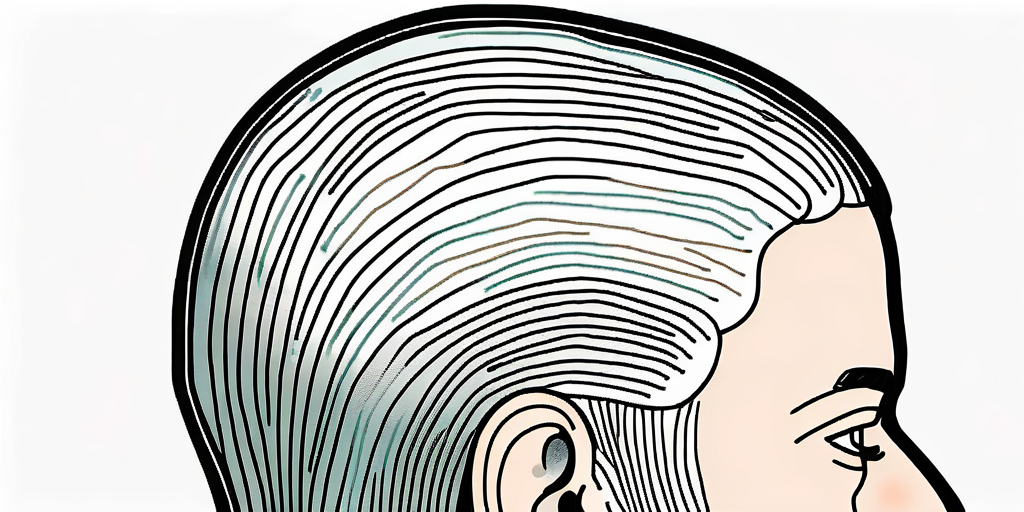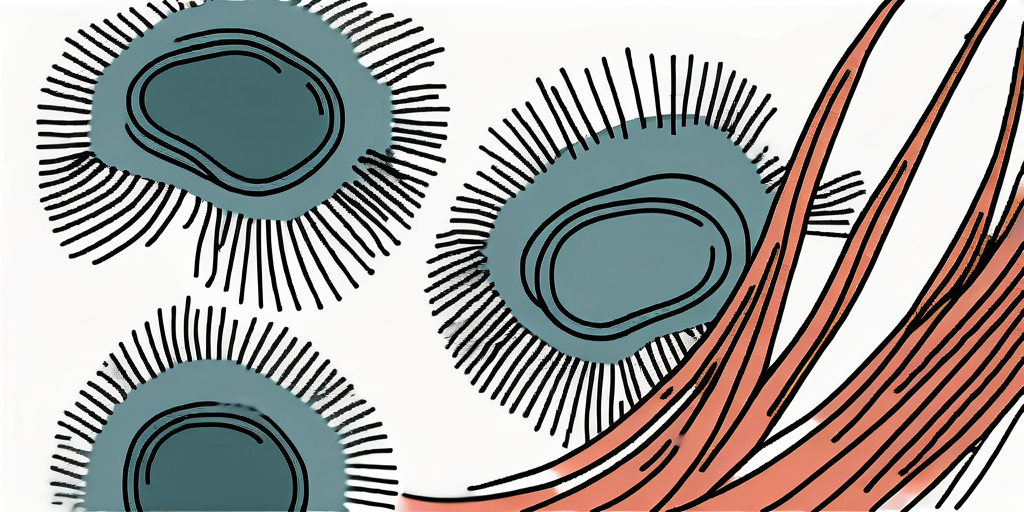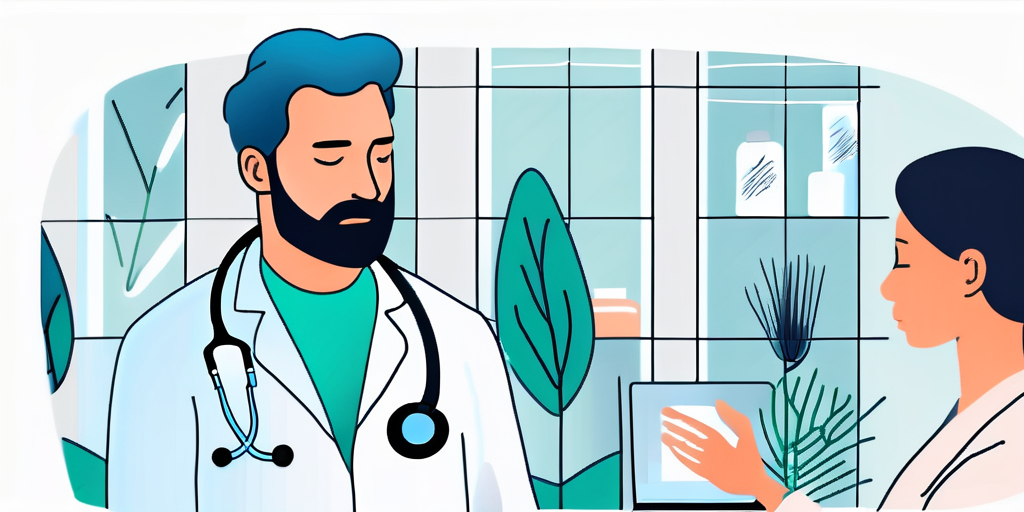Understanding the Link Between Itchy Scalp and Hair Loss

Having an itchy scalp is not only uncomfortable, but it can also lead to hair loss. In this article, we will delve into the science behind itchy scalp and explore the various causes and effects it can have on your hair. Additionally, we will discuss prevention, treatment options, and when it's necessary to seek professional help.
The Science Behind Itchy Scalp
An itchy scalp is often a sign of inflammation or irritation. The scalp contains numerous hair follicles and sebaceous glands, which produce sebum to lubricate the hair and skin. When the scalp becomes irritated, it can disrupt the normal functioning of these follicles and glands, leading to itchiness and discomfort.

In addition to several dermatologic conditions, there are factors that can contribute to scalp inflammation, including fungal infections, pollutants, shampoos, allergies, hormonal imbalances, and even stress. Each of these factors can disrupt the delicate balance of the scalp and trigger a response, resulting in itchiness and potential hair loss.
How Itchy Scalp Affects Your Hair
When left untreated, an itchy scalp can have a detrimental effect on the health of your hair. The constant scratching and inflammation can weaken the hair follicles, leading to hair breakage and eventual hair loss. It can also compromise the barrier in scalp skin that protects hair follicles from the immune system - a situation that can cause the immune system to attack the follicles.
Furthermore, the excessive scratching and inflammation can disrupt the scalp's natural microbiome, which consists of beneficial bacteria and fungi that help maintain a healthy scalp environment. When this delicate balance is disturbed, it can create an environment where harmful bacteria and fungi can thrive, leading to scalp conditions that exacerbate hair loss.
Prevention and Treatment
Fortunately, there are steps you can take to prevent and treat an itchy scalp. Maintaining a healthy scalp hygiene routine is essential. Avoiding irritants is another key factor, and shampoos and many scalp medications can certainly be part of the problem. Finding moisturizing and nourishing ingredients such as hyaluronic acid, Vitamin B3 (niacinamide), urea, and Vitamin E is important. You can add rejuvenating ingredients such as bakuchiol, a natural and gentle retinol alternative.
If stress is a contributing factor to your itchy scalp, finding healthy ways to manage stress, such as practicing relaxation techniques or engaging in regular exercise, can help alleviate symptoms. It's also important to address any underlying health conditions or hormonal imbalances that may be causing scalp inflammation.
Remember, a healthy scalp is the foundation for healthy hair. By understanding the science behind itchy scalp and taking proactive measures to address and prevent it, you can promote optimal hair health and minimize the risk of hair loss.
Prevention and Treatment
Fortunately, there are steps you can take to prevent and treat an itchy scalp. Maintaining a healthy scalp hygiene routine is essential. Finding moisturizing and nourishing ingredients such as Vitamin B3 (niacinamide), urea, caffeine, and Vitamin E is important. You can then consider rejuvenating the scalp environment with ingredients such as bakuchiol, a natural and gentle retinol alternative.
If stress is a contributing factor to your itchy scalp, finding healthy ways to manage stress, such as practicing relaxation techniques or engaging in regular exercise, can help alleviate symptoms. It's also important to address any underlying health conditions or hormonal imbalances that may be causing scalp inflammation.
Remember, a healthy scalp is the foundation for healthy hair. By understanding the science behind itchy scalp and taking proactive measures to address and prevent it, you can promote optimal hair health and minimize the risk of hair loss.
The Connection Between Itchy Scalp and Hair Loss
Inflammation is a key player in the link between itchy scalp and hair loss. When the scalp is inflamed, it can trigger an immune response that targets not only the irritants but also the hair follicles themselves. This immune response can lead to a condition called cicatricial alopecia, which is characterized by the destruction of hair follicles and irreversible hair loss.

Dandruff, a common cause of itchy scalp, also plays a role in hair loss. The flakes and debris associated with dandruff can clog the hair follicles, preventing new hair growth and potentially leading to hair thinning and bald patches.
Inflammation and Hair Loss
When the scalp is inflamed, it releases chemicals that can disrupt the normal hair growth cycle. This disruption can result in a condition called telogen effluvium, where an increased number of hair follicles enter the resting phase of the hair growth cycle. Over time, this can lead to significant hair loss.
In more severe cases, inflammation can lead to a condition known as alopecia areata. This autoimmune disorder causes the immune system to mistakenly attack the hair follicles, resulting in patchy hair loss.
Prevention and Treatment of Itchy Scalp
Fortunately, there are several strategies you can employ to prevent and treat an itchy scalp. When it comes to over-the-counter solutions, look for shampoos and conditioners specifically formulated for scalp health.
Another option is to explore natural remedies for itchy scalp. Ingredients with soothing and anti-inflammatory properties can provide relief to an irritated scalp. You can apply these remedies directly to the scalp or look for hair care products that contain these beneficial ingredients. Look for urea, caffeine, niacinamide, alpha-tocopherol , melatonin, and bakuchiol, to name a few of the more powerful ones.
When to Seek Professional Help
While mild cases of an itchy scalp can often be managed with over-the-counter solutions and natural remedies, there are times when professional help is necessary. If your symptoms persist despite these interventions or if you notice any severe scalp conditions, it is recommended to consult with a dermatologist or trichologist.

Recognizing Severe Scalp Conditions
Severe scalp conditions may include widespread inflammation, persistent flaking, or hair loss that does not improve with home treatment. Additionally, if you notice any changes to your scalp, such as redness, swelling, or open sores, it is important to stop any topical formula and speak with your doctor as these could be signs of a more serious underlying condition.
The Benefits of Alon Formulas
While there are numerous products and treatments available for itchy scalp and hair loss, not all of them address the root cause of these conditions. Many existing approaches focus on symptom management rather than supporting the overall health of the scalp and hair follicles.
This is where Alon formulas stand out. The Alon formulas are specially designed to repair, nourish, and shield the scalp using natural ingredients that support the scalp's delicate microbiome. By promoting a healthy and balanced scalp environment, these formulas provide long-term benefits for both scalp health and hair growth.
Unlike steroids or harsh chemicals that can disrupt the scalp fauna, Alon formulas work with the natural processes of the scalp, allowing it to heal and function optimally. The use of natural ingredients, such as botanical extracts and essential oils, further enhances the efficacy and safety of these formulas.
If you're ready to experience the benefits of Alon formulas for yourself, click here to purchase the products and take the first step towards a healthier, itch-free scalp and promote fuller, thicker hair.
Experience the transformative power of our products designed to moisturize, nourish, and protect your scalp, paving the way for a healthier, itch-free experience and luscious hair. Shop Now and take the first step towards the scalp care revolution with Alon Labs.

